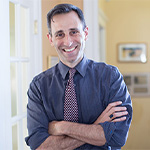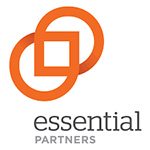Within the scope of the "Empowering CSOs and sparking change for tackling discrimination and promoting diversity” project a workshop titled “How can we have a dialogue on difficult topics?" was held with the facilitation of John Sarrouf from Essential Partners on 21 September.
Participants from civil society and the public sector discussed how they approach and relate to people, as well as their ability to transform relationships, throughout the workshop. They started to think about how to develop a healthy communication on difficult subjects without polarization in their own lives. In the group studies, they tried to compare their behaviours on how they respond to the challenges by asking each other questions by using two different methods including; persuasion and understanding.
|
John Sarrouf
 John Sarrouf studied in the master’s program in dispute resolution at the University of Massachusetts. John has facilitated dialogues on issues such as guns in America, police and community relations, Israel-Palestine, Muslim-Jewish relations, abortion, human sexuality in the Christian Church, and race in America. John Sarrouf teaches people how to facilitate dialogues across differences, and to mediate and manage conflict in their own lives and workplaces. He has helped to start dialogue programs at universities, organizations, cities and towns across the country including the University of San Diego, Tufts University, Wellesley College, Rutgers University, Northeastern University, Bridgewater College, and the University of the South. He served as the Assistant Director of Difficult Dialogues at Clark University and helped start the Peace and Conflict Studies program at Gordon College. Sarrouf teaches reconciliation at the European Center for the Study of War and Peace in Zagreb. John Sarrouf studied in the master’s program in dispute resolution at the University of Massachusetts. John has facilitated dialogues on issues such as guns in America, police and community relations, Israel-Palestine, Muslim-Jewish relations, abortion, human sexuality in the Christian Church, and race in America. John Sarrouf teaches people how to facilitate dialogues across differences, and to mediate and manage conflict in their own lives and workplaces. He has helped to start dialogue programs at universities, organizations, cities and towns across the country including the University of San Diego, Tufts University, Wellesley College, Rutgers University, Northeastern University, Bridgewater College, and the University of the South. He served as the Assistant Director of Difficult Dialogues at Clark University and helped start the Peace and Conflict Studies program at Gordon College. Sarrouf teaches reconciliation at the European Center for the Study of War and Peace in Zagreb.
|
Essential Partners
 Their mission is to foster constructive dialogue wherever conflicts are driven by differences of identities, beliefs, and values. Essential Partners has worked for three decades to facilitate conversations and equip people using our approach to dialogue. They bring a method that is applicable and adaptable to a wide variety of contexts. Our method, Reflective Structured Dialogue (RSD), relies on preparation, structure, questions, facilitation, and reflection to enable people to harness their capacity to have the conversations they need to have. Their mission is to foster constructive dialogue wherever conflicts are driven by differences of identities, beliefs, and values. Essential Partners has worked for three decades to facilitate conversations and equip people using our approach to dialogue. They bring a method that is applicable and adaptable to a wide variety of contexts. Our method, Reflective Structured Dialogue (RSD), relies on preparation, structure, questions, facilitation, and reflection to enable people to harness their capacity to have the conversations they need to have.
|

This project is funded by the European Union.





 John Sarrouf studied in the master’s program in dispute resolution at the University of Massachusetts. John has facilitated dialogues on issues such as guns in America, police and community relations, Israel-Palestine, Muslim-Jewish relations, abortion, human sexuality in the Christian Church, and race in America. John Sarrouf teaches people how to facilitate dialogues across differences, and to mediate and manage conflict in their own lives and workplaces. He has helped to start dialogue programs at universities, organizations, cities and towns across the country including the University of San Diego, Tufts University, Wellesley College, Rutgers University, Northeastern University, Bridgewater College, and the University of the South. He served as the Assistant Director of Difficult Dialogues at Clark University and helped start the Peace and Conflict Studies program at Gordon College. Sarrouf teaches reconciliation at the European Center for the Study of War and Peace in Zagreb.
John Sarrouf studied in the master’s program in dispute resolution at the University of Massachusetts. John has facilitated dialogues on issues such as guns in America, police and community relations, Israel-Palestine, Muslim-Jewish relations, abortion, human sexuality in the Christian Church, and race in America. John Sarrouf teaches people how to facilitate dialogues across differences, and to mediate and manage conflict in their own lives and workplaces. He has helped to start dialogue programs at universities, organizations, cities and towns across the country including the University of San Diego, Tufts University, Wellesley College, Rutgers University, Northeastern University, Bridgewater College, and the University of the South. He served as the Assistant Director of Difficult Dialogues at Clark University and helped start the Peace and Conflict Studies program at Gordon College. Sarrouf teaches reconciliation at the European Center for the Study of War and Peace in Zagreb. 


